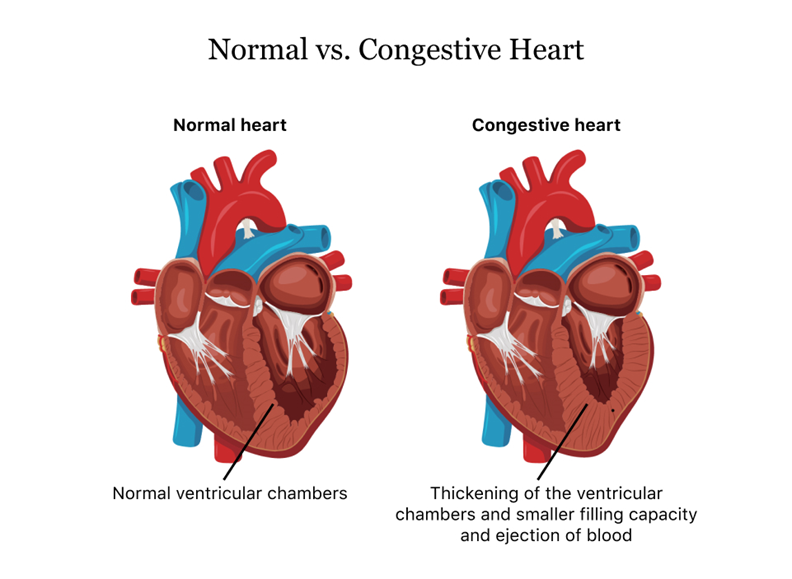A nurse is assessing a client with congestive heart failure (CHF). Which assessment tool will provide a reliable measure of fluid retention for this client?
Cardiac monitoring
Daily weight measurement
Blood pressure monitoring
Urine output measurement
The Correct Answer is B
Choice A Reason:
Cardiac monitoring involves the continuous observation of the heart’s electrical activity, typically using an electrocardiogram (ECG). While cardiac monitoring is essential for detecting arrhythmias and other cardiac events, it does not directly measure fluid retention. Fluid retention in CHF patients can lead to symptoms such as edema and weight gain, which are not directly assessed through cardiac monitoring.
Choice B Reason:
Daily weight measurement is a reliable and practical method for assessing fluid retention in clients with congestive heart failure. Fluid retention leads to an increase in body weight, and monitoring daily weight changes can help detect fluid accumulation early. A sudden weight gain of more than 2-3 pounds in a day or 5 pounds in a week is a significant indicator of fluid retention and worsening heart failure. This method is non-invasive, easy to perform, and provides valuable information for managing CHF.

Choice C Reason:
Blood pressure monitoring is crucial for managing clients with CHF, as hypertension can exacerbate heart failure. However, blood pressure readings alone do not provide a direct measure of fluid retention. While fluid overload can affect blood pressure, it is not a specific or sensitive indicator of fluid status. Blood pressure monitoring should be used in conjunction with other assessment tools to manage CHF effectively.
Choice D Reason:
Urine output measurement is an important parameter for assessing kidney function and fluid balance. In clients with CHF, reduced urine output can indicate worsening heart failure and fluid retention. However, urine output alone may not provide a complete picture of fluid status, especially if the client is on diuretic therapy. Daily weight measurement remains a more direct and reliable method for assessing fluid retention in CHF patients.
Nursing Test Bank
Naxlex Comprehensive Predictor Exams
Related Questions
Correct Answer is A
Explanation
Choice A reason: The glossopharyngeal nerve (CN IX) is primarily responsible for the gag reflex. It provides sensory input from the pharynx and posterior third of the tongue, which triggers the gag reflex when stimulated. This nerve plays a crucial role in swallowing and the reflexive action to prevent choking.
Choice B reason: The trigeminal nerve (CN V) is responsible for facial sensation and motor functions such as biting and chewing. It does not play a direct role in the gag reflex. While it is important for other sensory and motor functions, it is not involved in the reflex being assessed here.
Choice C reason: The vagus nerve (CN X) also contributes to the gag reflex by providing motor innervation to the muscles of the pharynx and larynx. However, the primary sensory input for the gag reflex comes from the glossopharyngeal nerve (CN IX). The vagus nerve works in conjunction with CN IX to complete the reflex action.
Choice D reason: The hypoglossal nerve (CN XII) controls the movements of the tongue. It is essential for speech and swallowing but does not have a role in the gag reflex. The hypoglossal nerve’s primary function is motor control of the tongue muscles.
Correct Answer is ["0.4"]
Explanation
Step-by-Step Calculation
Step 1: Identify the desired dose and the concentration of the medication.
Desired dose = 4 mg
Concentration = 10 mg/mL
Step 2: Set up the calculation to find the volume to administer.
Volume to administer (mL) = Desired dose (mg) ÷ Concentration (mg/mL)
Step 3: Perform the division.
4 mg ÷ 10 mg/mL = 0.4 mL
Step 4: Round the answer to the nearest whole number.
0.4 mL rounded to the nearest whole number is 0 mL
Step 5: Apply the instruction to use a leading zero if it applies and do not use a trailing zero.
The final volume to administer is 0.4 mL.
Therefore, the nurse should administer 0.4 mL of furosemide via IV bolus to the client.
Whether you are a student looking to ace your exams or a practicing nurse seeking to enhance your expertise , our nursing education contents will empower you with the confidence and competence to make a difference in the lives of patients and become a respected leader in the healthcare field.
Visit Naxlex, invest in your future and unlock endless possibilities with our unparalleled nursing education contents today
Report Wrong Answer on the Current Question
Do you disagree with the answer? If yes, what is your expected answer? Explain.
Kindly be descriptive with the issue you are facing.
